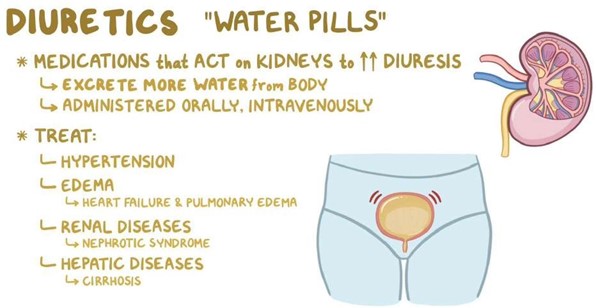A client is prescribed oral potassium supplements for hypokalemia. The nurse instructs the client to take the medication:
With food or a full glass of water.
On an empty stomach with a sip of water.
With milk or antacids to prevent irritation.
With grapefruit juice to enhance absorption.
The Correct Answer is A

Oral potassium supplements can cause stomach irritation or laxative effect if taken without enough fluid or food.
Taking the medication with food or a full glass of water can help prevent these side effects and improve absorption.
Choice B is wrong because taking the medication on an empty stomach with a sip of water can increase the risk of stomach irritation or laxative effect and reduce absorption.
Choice C is wrong because taking the medication with milk or antacids can interfere with the absorption of potassium and cause hyperkalemia (high blood potassium levels).
Choice D is wrong because taking the medication with grapefruit juice can also interfere with the absorption of potassium and cause hyperkalemia.
Grapefruit juice can also interact with some medications that affect potassium levels, such as angiotensin-converting enzyme (ACE) inhibitors and potassium- sparing diuretics.
Nursing Test Bank
Naxlex Comprehensive Predictor Exams
Related Questions
Correct Answer is ["A","B","C","E"]
Explanation
Choice A reason: This hypotonic saline solution is often used after initial resuscitation, especially when the patient’s serum sodium is normal or elevated. It helps replace intracellular fluid losses and provides ongoing hydration without excessively increasing sodium levels. It is typically administered once the initial intravascular volume is restored with isotonic fluids.
Choice B reason: This isotonic saline solution is the first-line intravenous fluid used in DKA. It helps expand intravascular volume quickly, restore tissue perfusion, and correct hypovolemia caused by osmotic diuresis. It is given initially as a bolus, followed by continuous infusion until the patient is stabilized.
Choice C reason: This dextrose-containing solution is introduced once blood glucose falls to approximately 200–250 mg/dL. At this point, insulin therapy must continue to clear ketones and correct acidosis, but dextrose is added to prevent hypoglycemia. It is usually combined with saline (e.g., D5 0.45% NS) to balance hydration and glucose support.
Choice D reason: This balanced electrolyte solution is not typically the preferred fluid in DKA management because the lactate component may complicate interpretation of acid–base status. Although it can expand volume, it is generally avoided in favor of saline solutions that more directly address dehydration and electrolyte imbalance in DKA.
Choice E reason: This form of insulin is the only type used intravenously in DKA. A continuous infusion of regular insulin is essential to reduce blood glucose, suppress ketone production, and correct metabolic acidosis. It is carefully titrated with close monitoring of electrolytes, especially potassium, since insulin drives potassium into cells and can cause hypokalemia.
Correct Answer is A
Explanation

Fluid overload, also called hypervolemia, is a condition in which the body has too much water.
It can cause edema, hypertension, shortness of breath, and cardiovascular problems.
Diuretics are medications that help the body remove excess fluid through urine.
They are commonly used to treat fluid overload caused by heart failure, kidney failure, cirrhosis, and other conditions.
Choice B is wrong because encouraging increased fluid intake would worsen the fluid overload and increase the risk of complications.
Choice C is wrong because providing a high-sodium diet would also worsen the fluid overload and increase the risk of complications.
Sodium is an electrolyte that regulates fluid balance in the body.
Excess sodium intake can cause water retention and increase blood pressure.
Choice D is wrong because elevating the affected extremities is not an appropriate intervention for fluid overload.
Elevating the extremities can help reduce swelling caused by local factors such as injury or inflammation, but it does not address the underlying cause of fluid overload.
Whether you are a student looking to ace your exams or a practicing nurse seeking to enhance your expertise , our nursing education contents will empower you with the confidence and competence to make a difference in the lives of patients and become a respected leader in the healthcare field.
Visit Naxlex, invest in your future and unlock endless possibilities with our unparalleled nursing education contents today
Report Wrong Answer on the Current Question
Do you disagree with the answer? If yes, what is your expected answer? Explain.
Kindly be descriptive with the issue you are facing.
